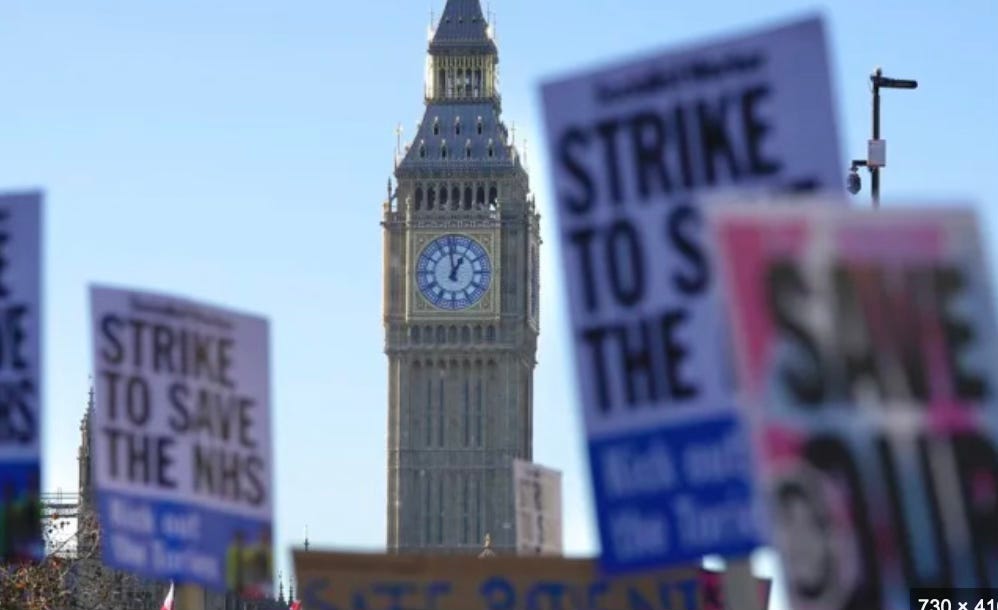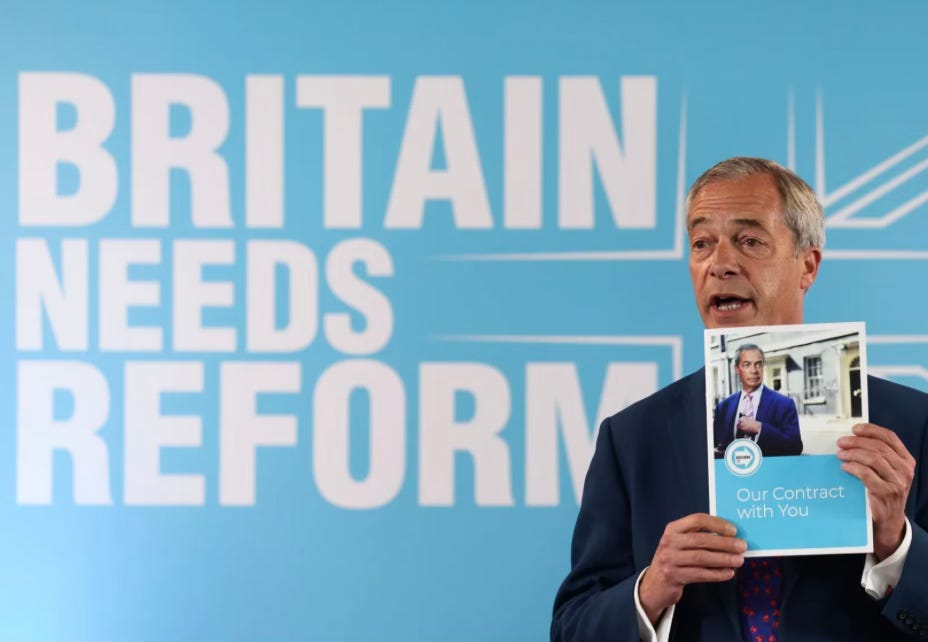The Left’s Reckoning: Organising Against Starmer’s Centrism and Reform’s Populism
In the aftermath of the 2024 General Election, the British left faces a dual challenge. On one side, Keir Starmer has consolidated power within the Labour Party, purging its left-wing elements while presenting himself as the only viable alternative to the Tories. On the other, the populist right, spearheaded by Reform UK, is successfully tapping into working-class discontent, positioning itself as the true opposition to a failed political establishment (Dunt, 2023).
However, the current political landscape offers an unprecedented opportunity for the left. The Conservative Party is in disarray, fractured by internal divisions and electoral defeats, while Labour’s drift towards centrism and corporate-friendly policies is leaving many voters disillusioned. This vacuum of leadership and vision presents a moment for the left to seize the narrative, rally support, and establish itself as the true alternative to the status quo. If the left can effectively mobilise and articulate a bold, transformative agenda, it can break through the malaise of mainstream politics and re-engage working-class voters who feel abandoned by both major parties (Seymour, 2021).
Exposing Starmerism: Austerity in Disguise
Starmer has built his leadership on a strategy of depoliticisation, portraying Labour as a ‘sensible’ and ‘pragmatic’ party in contrast to the ideological chaos of the Tories and the supposed radicalism of Corbynism. His leadership, however, is not one of meaningful transformation but of carefully managed continuity. Starmer does not represent a genuine alternative to Tory rule—he is simply the establishment’s Plan B (Jones, 2022).
Austerity, though rebranded in softer rhetoric, remains embedded in Starmer’s Labour. The promise of a £28bn green investment plan was scrapped. Wealth taxes were never seriously considered. Renationalisation, once a cornerstone of Labour’s economic vision, has been categorically rejected (Blyth, 2013). The party now offers little beyond managerial competence, preferring to assure the City of London rather than empower workers. Labour under Starmer is not a vehicle for real change; it is a safety net for a system in crisis.
The left must not allow him to posture as a ‘safe pair of hands’ when his leadership is fundamentally about preserving Britain’s broken economic model. Starmerism thrives on a lack of opposition, and it is this vacuum that must be filled with radical, grassroots organising (Piketty, 2020).
Starmer’s abandonment of rent controls, refusal to tax the wealthy, and rejection of public ownership are alienating renters, youth activists, and trade unionists alike. If Labour continues down this path, it will enter the next election as little more than a centrist caretaker, devoid of ideological purpose—paving the way for either voter apathy or a dangerous swing to the right (Mair, 2013).
Organising Beyond Labour
With Labour’s internal democracy hollowed out, the left cannot rely on the party to enact progressive policies. Instead, it must build a broader ecosystem of power that extends beyond parliamentary politics. Strengthening trade unions and grassroots movements will be essential to resisting both austerity and corporate dominance. Expanding independent media will counter the influence of the right-wing press and Starmer-aligned outlets, ensuring that the left can shape public discourse on its own terms (Fisher, 2009).
While Labour’s internal structures are resistant to meaningful change, history shows that real transformation has never been confined to Westminster. Movements such as the early Momentum grassroots surge, which nearly led to a socialist Labour government in 2017, or trade union victories in forcing pay rises despite government opposition, demonstrate the power of organised pressure. The left must not only build alternative political structures but actively engage disillusioned Labour voters—through housing campaigns, strike support, and radical local initiatives (McAlevey, 2016).
Additionally, local politics and grassroots activism must be prioritised. Victories in local councils can lay the groundwork for national influence, creating strongholds where socialist policies are implemented successfully. Tenants’ unions, climate action networks, and cooperative economic projects must be expanded to give people tangible proof that a different model of governance is possible. The left cannot simply critique Labour—it must provide a working alternative.
A key lesson from history is that local success breeds national influence. Syriza in Greece, Podemos in Spain, and even the early Labour Party in the UK built their power bases through municipal victories before becoming major national forces. The left must take a long-term strategic approach, ensuring that electoral success is linked to on-the-ground movement-building rather than fleeting protest votes.
The Threat of Reform UK: Don’t Cede the Working Class to the Right
As Labour drifts rightward, Reform UK is seizing the opportunity to present itself as the true voice of working-class frustration. The party capitalises on the economic stagnation, the housing crisis, and the decline of public services, redirecting anger away from the ruling class and towards migrants, ‘woke elites,’ and international institutions. This is a dangerous narrative, and it must be challenged head-on (Goodwin, 2023).
The working-class anger that Farage and Tice exploit is real, and if the left does not offer an alternative, Reform’s influence will only grow. Successful left movements have neutralised far-right populism by speaking to economic frustration head-on. Jean-Luc Mélenchon’s La France Insoumise directly appealed to voters flirting with Le Pen by addressing inequality, just as Bernie Sanders pulled working-class Americans away from Trump by exposing corporate greed. The UK left must do the same—directing voter anger towards the billionaires hoarding wealth, rather than immigrants or ‘woke elites’ (Mouffe, 2018).
Reclaiming the Language of Populism
Populism has long been painted as a tool of the far right, but the left must reclaim it as a means of mobilising people against real sources of economic and social injustice. The 1945 Labour government successfully framed nationalisation as a battle between ordinary people and the economic elite, while the 1980s miners' strikes presented Thatcher’s government as an oppressive force against working-class livelihoods. These historical moments show that when the left uses populist language effectively, it can win broad support and drive major political change.
This means crafting messages that directly challenge elite power, focusing on economic struggles rather than manufactured culture wars. The rhetoric must be clear, emotional, and uncompromising: The billionaires are taking your wages. Landlords are bleeding you dry. The government is serving the wealthy, not you. By shifting the focus back to economic justice, the left can disrupt the right’s narrative and reframe populism as a working-class tool for liberation (Zuboff, 2019).
To achieve this, the left must also modernise its communication strategy. The rapid growth of online platforms like TikTok, YouTube, and community-driven media outlets means that traditional newspaper endorsements or TV interviews are no longer enough. The right has successfully weaponised these tools—Reform UK and the far-right online ecosystem consistently dominate digital engagement. The left must counter this by producing engaging, viral content that simplifies complex issues into compelling, people-centred narratives. Instead of being reactive, it must actively dictate the terms of debate, ensuring that the fight remains focused on corporate exploitation, wealth inequality, and social justice rather than the distractions of reactionary culture wars.
Additionally, adopting successful messaging strategies from international left movements can help shape the narrative. Bernie Sanders' Not me, us campaign in the U.S. successfully built a mass movement by making politics about collective power rather than individual politicians. Similarly, Jean-Luc Mélenchon’s Unsubmissive France movement effectively tapped into working-class frustration in France, using direct and confrontational messaging that made clear who the enemies of progress were. The UK left must adopt a similar strategy—naming the enemies of working people and making it clear that the alternative to billionaire rule is real democracy, where the economy works for all, not just the elite.
A New Electoral Strategy: What Should the Left Do?
If the left is serious about electoral success, it must be strategic. Independent socialist candidates should target areas where Labour is losing credibility—former ‘Red Wall’ seats, disenfranchised urban communities, and regions where Green Party alliances could form a united front. However, elections are just one battleground. Long-term success depends on community engagement, from tenant unions fighting rent increases to strike solidarity campaigns that make the left an active force in people’s lives (Schlosberg, 2021).
The left must also embrace tactical voting where necessary—but not in the simplistic sense of voting Labour just to keep the Tories out. Instead, tactical voting should be about supporting left-wing candidates with real socialist policies, whether they come from independent socialist movements, the Green Party, trade union-backed initiatives, or other progressive alliances. The goal must be systemic change, not maintaining the status quo. The 2024 election showed that the right can splinter—but so can the left. Building coalitions of shared interests is critical for long-term influence, ensuring that votes translate into meaningful change rather than just reinforcing centrist control.
Conclusion: A Left That Fights, Not Concedes
The left faces a defining moment. The Conservative Party is collapsing under the weight of its own failures, and Labour under Starmer is content to offer only minor adjustments to the status quo. This political vacuum presents both a danger and an opportunity: if the left does not rise to fill it, the populist right will.
The challenge is not just to resist but to build. A viable left-wing movement must be bold, unafraid to challenge wealth and power, and deeply embedded in working-class communities. It must articulate a vision of a Britain where homes are affordable, wages are high, nationalised industries work for the people, the NHS is fully funded and protected from privatisation, schools receive the resources they need, climate policy prioritises a just transition without passing costs onto ordinary people, and a wealth tax ensures that those who have profited most contribute their fair share to society (Varoufakis, 2021).
This is not a time for half-measures or moderation. The battle for the future is underway, and the left must decide whether it will lead—or be left behind.
References
Blyth, M. (2013). Austerity: The History of a Dangerous Idea. Oxford University Press.
Dunt, I. (2023). How Westminster Works... and Why It Doesn’t. HarperCollins.
Fisher, M. (2009). Capitalist Realism: Is There No Alternative? Zero Books.
Goodwin, M. (2023). Values, Voice and Virtue: The New British Politics. Penguin.
Jones, O. (2022). The Establishment: And How They Get Away with It. Penguin.
Mair, P. (2013). Ruling the Void: The Hollowing of Western Democracy. Verso.
McAlevey, J. (2016). No Shortcuts: Organizing for Power in the New Gilded Age. Oxford University Press.
Mouffe, C. (2018). For a Left Populism. Verso.
Piketty, T. (2020). Capital and Ideology. Harvard University Press.
Schlosberg, J. (2021). Corrupt Media, Corrupt Politics. Pluto Press.
Seymour, R. (2021). The Twittering Machine. Indigo Press.
Varoufakis, Y. (2021). Another Now. Vintage.
Zuboff, S. (2019). The Age of Surveillance Capitalism. PublicAffairs.







